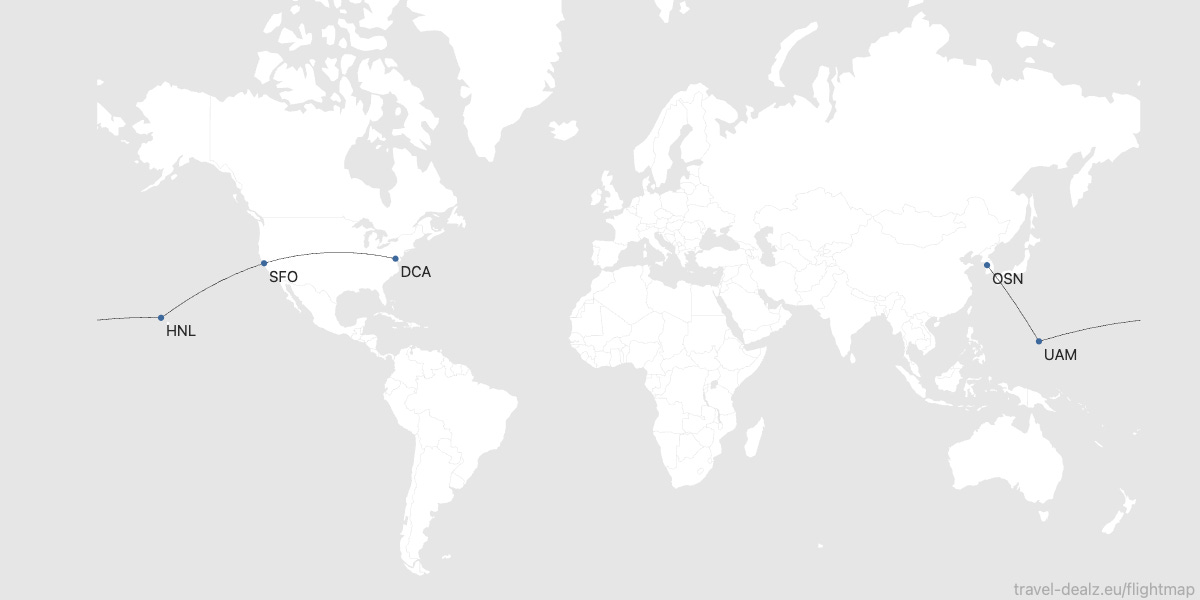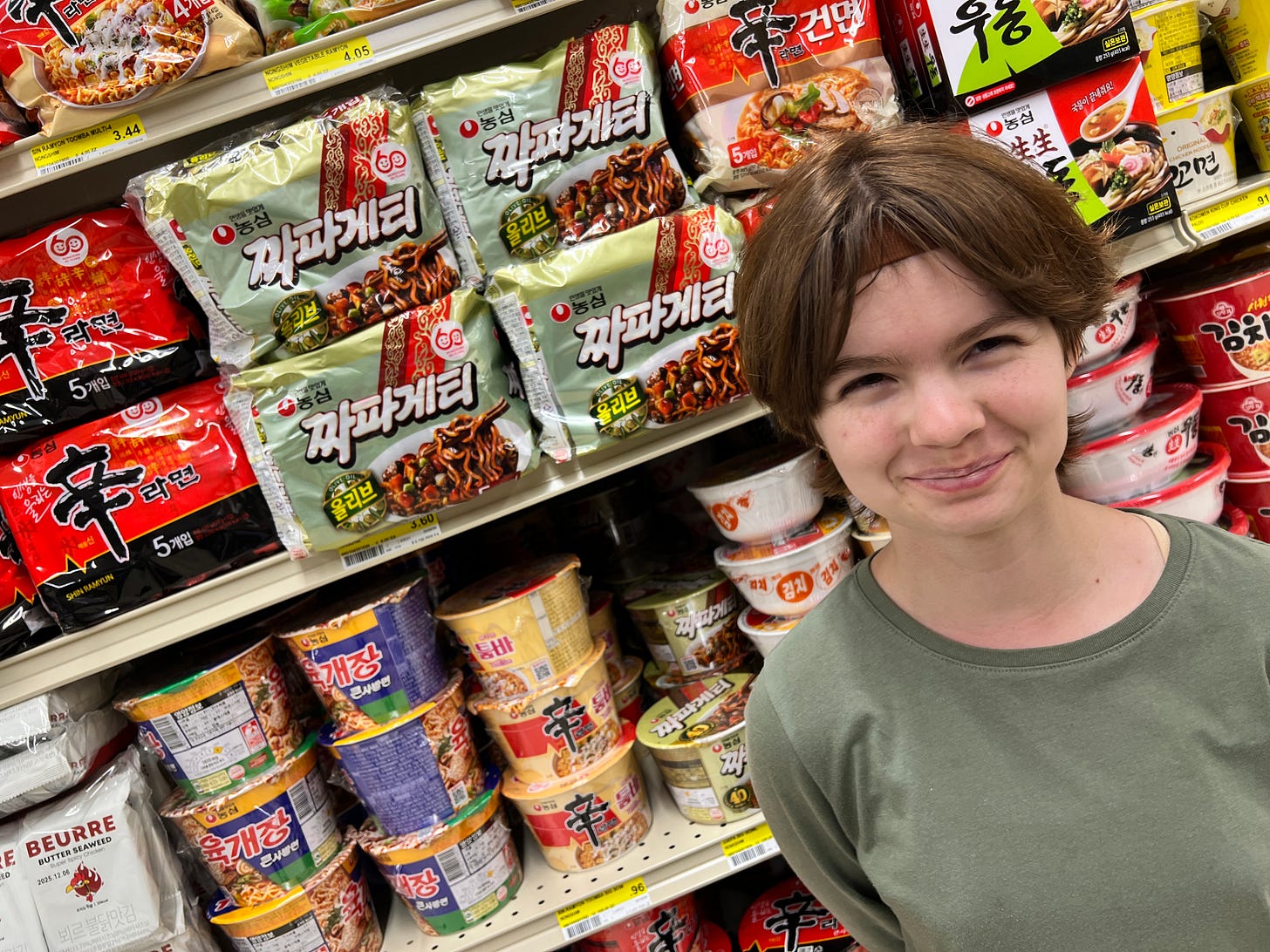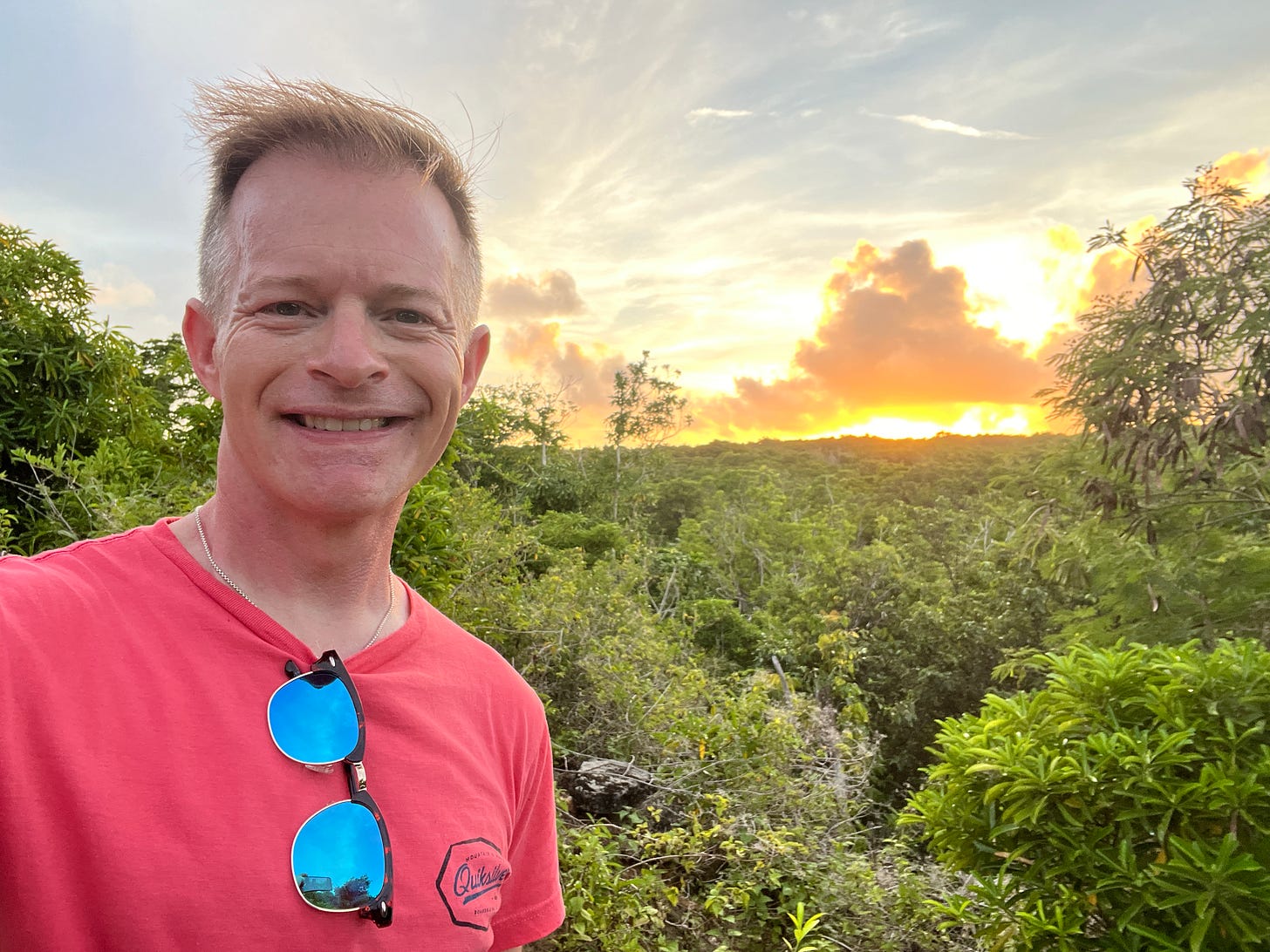About This Series
Wander, Wonder, Write is a travelogue-style memoir told in daily essays from a father-daughter trip across east Asia. Blending storytelling, introspection, and the slow unfolding of healing, this series explores what it means to be present—not just in new places, but with oneself. These essays are less about itinerary and more about what happens when we drop the agenda and let meaning emerge.
Know someone who would enjoy reading this? Please considering sharing it with them!
Are we there yet?
After a full day of walking and hiking in the hot, humid sun of Guam, we were both fully ready to zonk out for a few hours of flying overnight. Unfortunately, the universe did not cooperate with our circadian needs.
We were scheduled to be at the passenger terminal for roll call at midnight. Roll call is just what it sounds like—the crew reads off the names of passengers who’ve signed up to fly. If you’re present when your name is called, your paperwork checks out, and there’s space on board, you’re added to the manifest. It’s essentially your ticket. Roll call is usually about three hours before takeoff; last night, it was closer to five. We couldn’t sleep—shuttled from room to room every hour or so like self-loading cargo, part of the delicate dance that is military airlift command. Once airborne, the kiddo and I stretched out in our sleeping bags and caught as many Zzz’s as we could. The flight to Korea was four hours. We slept through most of it.
We landed in Korea without much fanfare. Customs was a breeze, given there were only 10 passengers on the airplane. We stepped onto Osan Air Base and instantly felt like we were back at Andrews in D.C. The weather was virtually identical as it was back home. Cherry trees look the same. All the signage is in English. Other than a few things like license plates on cars, it would take someone a few minutes before they realized they were in another country.
Since arriving, we’ve done what tired travelers do—we checked into our hotel. We shopped for groceries. We tried to make homemade cookies on a skillet because we don’t have an oven (they turned out kind of like pancakes). We took naps to shake off the jet lag, and watched the quiet world of Osan pass by outside our hotel window.
There’s nothing particularly dramatic to write about. No lesson, no turning point. Which is kind of bothering me. My mind is buzzing like it’s holding a secret that wants out. A low, persistent hum under the quiet. So I sit here, staring at the blank screen, growing anxious and irritable. My thoughts grow more desperate as pressure mounts to keep up my daily schedule of posting for this round-the-world journey.
I tell myself I need something dramatic to write about. I need meaning. I need drama. What will I do if I don’t have a story to tell!? No one will read my work! We have finally arrived in Korea after a week of travel! Today’s post should be EPIC, I tell myself. But it isn’t epic.
It’s Monday.
And we’re tired.
And when I get like this—grasping for something bigger, more exciting, more profound—it usually means I’ve lost sight of something essential. That I’ve mistaken attention for connection. That I’ve confused being noticed with being known.
And so I pause for a moment because I recognize these feelings. I have dealt with them before. They indicate something important I need to pay attention to—they indicate I have wandered a bit off course. And what I have learned when I feel this way isn’t that I need a story. It’s that I need to get real. I need to confess.
Not in the religious sense. Not even in the “I did something wrong” sense. I mean the kind of confession that feels like a spiritual breath. Like taking off armor that’s grown too heavy to wear. I need to clean house, so to speak, because I feel spiritually cluttered. And so I ask myself a few key questions:
Why do I choose to write every day and publish online?
Who am I serving by doing this?
What are my expectations?
These questions bring me to a deeper unsettling question:
Who am I when I am not being admired?
That’s a question that has quietly stalked the edges of my adult life. I’ve spent years chasing accomplishments, approval, and admiration—not always consciously, but certainly persistently. I didn’t see it as a craving at first. I thought it was drive. Excellence. Ambition. But beneath all of that was a quieter truth:
I feel most alive when someone else tells me I’m valuable.
I’ve built entire identities around the pursuit of attention. When people compliment my talent, my intellect, my appearance—it lights me up like a switch has been flipped. And when that attention fades, even briefly, a sort of panic creeps in. I begin to doubt everything: my work, my relationships, my worth. The absence of affirmation feels like absence of self.
Getting real and cleaning house is my way of letting go of that desperate need for external validation. It returns me to a center where I am reminded of what is real. What is true.
So, what is true?
Here’s one truth: I’ve leaned into persona lately.
Since publishing publicly about getting my service dog and the recovery journey I’ve been on, I’ve told stories that cast me in shadow and grit, that build a persona version of myself: The grizzled veteran. The man with scars from Iraq. The one who’s seen too much. And yes—most of that is real. But here’s another truth: the pain that still haunts me most didn’t come from war. It came from childhood.
And I never talk about that.
It’s easier, cleaner, more compelling to say “the war did this to me” than to say “I was a child who wasn’t safe, and I’m still trying to learn how to feel safe in the world.”
But that’s the truth. And when I don’t tell the truth, I feel it. I start to spin. I lose presence. I get anxious and disconnected and lonely—even with a phone full of friends who’d answer if I called.
So today, I return to center. I write about trying to let go of the act. I write about not needing to be admired. I write about the slow, aching desire to be real. Just real. Not clever, not wise, not admirable. Just… me.
I think that’s the only story worth telling today. Because that’s what is going on right now. Not everything I do has profound meaning or deep insight. Sure I like to weave a killer tale and write flowery prose that captures the essence and magic of being in the moment. Yesterday’s sunset hike was especially fun to write about; it needed no embellishment whatsoever.
But today? Well, right now the kiddo is snoring her little 13-year old snores. I am wearing the same shirt I had on more than 24 hours ago, and I smell every bit of it. I am watching the sun begin to set outside my window and wishing I had the energy to get up, hop on the train into Seoul and find some photo-worthy adventures. Instead, I am likely going to wrap up this publication, go into the kitchen, chop up some veggies and cook us some dinner.
We’ll probably be asleep before 9pm.
That’s it, folks. Welcome to Korea, where the most meaningful lesson so far from this journey is this: magic happens when we let it. And magic right now looks like a comfortable, quiet hotel room with a dad and his daughter who need some rest. No crazy taxi rides in the middle of the night. No epic cityscapes or amazing street food.
Maybe that’s tomorrow’s story.
Today, I’m just going to let what is real be real, and in doing so, I am returning to the only me I need to be.
About the Author
ES Vorm, PhD, is a Navy veteran and aviator turned scientist, now walking a quieter road as a full-time writer, father, and wanderer. His work explores the unsteady terrain of recovery, connection, and the search for meaning through small, ordinary moments. He writes from experience—often raw, often unresolved—and believes the truest stories are the ones that begin when we stop performing and start telling the truth. You can find his essays and reflections at esvorm.substack.com.








". . . mistaken attention for connection. That I’ve confused being noticed with being known." Deep words, my friend. For many reasons, this entire piece is one of my personal favorites.